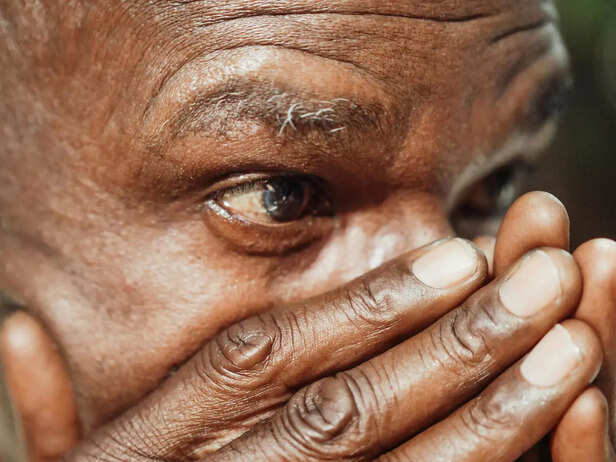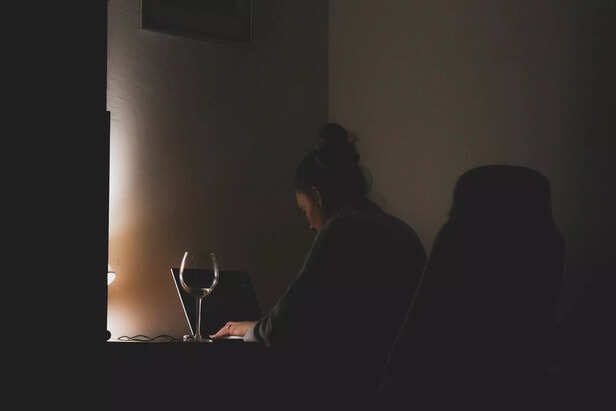Why You Break Down in Private and How the Gita Tells You to Deal With It in Public
Riya Kumari | Jun 01, 2025, 19:23 IST
( Image credit : Freepik, Timeslife )
Let’s talk about your breakdowns. Yes, those—capital-B, capital-D BreakDowns that happen when you're two passive-aggressive texts away from combusting, or when life just sucker-punches you mid-scroll through memes. But here's the thing: you’re not doing it in public. Oh no. You’re doing it like a seasoned emotional ninja—quiet sob in the Uber, existential dread in the office loo, and full-blown identity crisis while pretending to “meditate” (aka nap) during yoga class. Relatable? Extremely.
Let’s be honest. Most of us aren’t falling apart in grand, poetic ways. We’re breaking down quietly—on a balcony at night, on a metro ride home, or in the corner of a bathroom at work, face buried in our palms like it’s the only thing keeping us from dissolving. And still, the next morning, we get up. We show up. We do what needs to be done. Not because we’ve healed overnight. But because there’s something in us—call it strength, call it duty, call it stubborn hope—that says: Even now, go on. And strangely, that—not the breakdown, not even the getting up—but the choice to go on? That’s exactly what the Bhagavad Gita is all about.
When You Break Down, You're Not Weak. You're Just Human

The Gita begins with a breakdown. Yes, this sacred, philosophical text that’s quoted at funerals and framed on walls doesn’t start with wisdom—it starts with a man in complete emotional collapse. Arjuna, the warrior prince, is standing on a battlefield, looking at people he knows—mentors, cousins, old friends—and realizing he has to fight them. And he can't. He literally sinks to the ground, drops his bow, and says, “I can't do this.”
This is not a moment of drama. It’s a moment of clarity—the kind that many of us recognize. When the world asks too much. When you suddenly realize the price of what life is demanding from you. And here's the thing: Arjuna's breakdown is not condemned. Krishna doesn't tell him, “Man up.” He listens. And then he speaks—not to shame him, but to remind him of something deeper.
The Gita Doesn’t Say “Don’t Break.” It Says “Don’t Stay Broken.”

What Krishna offers Arjuna isn’t a motivational speech. He doesn’t promise that everything will be okay. What he says is far more honest—and more powerful. He says: You are not just this moment. You are not your fear. Not your confusion. Not your exhaustion. You are something deeper. You have a self that is untouched by all this chaos.
And your job, right now, isn’t to erase your feelings—it’s to rise through them. This is the core teaching: You can feel everything and still act with clarity. The Gita never asks you to stop crying. It just asks that when you’re done—you pick up your bow again.
Most People Don’t See What You're Carrying. But That Doesn’t Make It Any Lighter

We live in a world that glorifies composure. You’re expected to keep your mess private, your breakdowns quiet, and your struggles invisible. But silence doesn’t mean absence. Just because you didn’t cry in front of others doesn’t mean you didn’t feel it just as deeply. And sometimes, that invisibility becomes heavy. You wonder if you’re the only one holding it together on the outside and falling apart inside.
You're not. In the Gita, Arjuna breaks down in front of God. He cries. He doubts. He questions everything. If he can fall apart, you’re allowed to too. The wisdom is not in avoiding the fall. The wisdom is in rising anyway.
Show Up. Even When It’s Hard. Especially When It’s Hard

Here’s what the Gita teaches that nobody tells you in inspirational Instagram quotes: You don’t get to wait for life to feel perfect before you act. You don't get to postpone your responsibilities until your heart stops hurting. You don’t get to abandon the people who depend on you just because you’re tired or lost. Not because you shouldn't feel those things—but because feeling them doesn’t mean you’ve lost your purpose.
Krishna tells Arjuna: Act. Without attachment to the result. Without letting your pain decide who you are. It’s not cold advice. It’s clear. There are times in life when you're going to have to carry sadness in one hand and still keep doing the right thing with the other. Not because you're faking strength. But because you are strength—even if you don’t feel like it in the moment.
So, Why Do We Break Down in Private?

Because it's safe. Because we don't want to be seen as fragile in a world that rewards armor over honesty. But the Gita doesn't ask you to hide your pain. It asks you to see through it. To realize: Yes, you feel broken. But you’re not breakable.
The same Arjuna who collapses in despair becomes the Arjuna who stands tall—not because the situation changed, but because his understanding did. And that’s what the Gita gives us: Not escape, but perspective. Not comfort, but courage.
CONCLUSION
You are allowed to fall apart in private. You are allowed to cry, doubt, and question everything. But when it’s time to act—when life calls you, as it always does— Let the deeper part of you answer. The part that knows who you are beyond this moment.
The part that remembers: Your soul is steady. Even when everything else shakes. And maybe that’s the real teaching of the Gita. Not that you should never break down. But that every time you do—you still get to rise.
When You Break Down, You're Not Weak. You're Just Human

Emotions
( Image credit : Pexels )
The Gita begins with a breakdown. Yes, this sacred, philosophical text that’s quoted at funerals and framed on walls doesn’t start with wisdom—it starts with a man in complete emotional collapse. Arjuna, the warrior prince, is standing on a battlefield, looking at people he knows—mentors, cousins, old friends—and realizing he has to fight them. And he can't. He literally sinks to the ground, drops his bow, and says, “I can't do this.”
This is not a moment of drama. It’s a moment of clarity—the kind that many of us recognize. When the world asks too much. When you suddenly realize the price of what life is demanding from you. And here's the thing: Arjuna's breakdown is not condemned. Krishna doesn't tell him, “Man up.” He listens. And then he speaks—not to shame him, but to remind him of something deeper.
The Gita Doesn’t Say “Don’t Break.” It Says “Don’t Stay Broken.”

Meditate
( Image credit : Pexels )
What Krishna offers Arjuna isn’t a motivational speech. He doesn’t promise that everything will be okay. What he says is far more honest—and more powerful. He says: You are not just this moment. You are not your fear. Not your confusion. Not your exhaustion. You are something deeper. You have a self that is untouched by all this chaos.
And your job, right now, isn’t to erase your feelings—it’s to rise through them. This is the core teaching: You can feel everything and still act with clarity. The Gita never asks you to stop crying. It just asks that when you’re done—you pick up your bow again.
Most People Don’t See What You're Carrying. But That Doesn’t Make It Any Lighter

Pain
( Image credit : Pexels )
We live in a world that glorifies composure. You’re expected to keep your mess private, your breakdowns quiet, and your struggles invisible. But silence doesn’t mean absence. Just because you didn’t cry in front of others doesn’t mean you didn’t feel it just as deeply. And sometimes, that invisibility becomes heavy. You wonder if you’re the only one holding it together on the outside and falling apart inside.
You're not. In the Gita, Arjuna breaks down in front of God. He cries. He doubts. He questions everything. If he can fall apart, you’re allowed to too. The wisdom is not in avoiding the fall. The wisdom is in rising anyway.
Show Up. Even When It’s Hard. Especially When It’s Hard

Study at night
( Image credit : Pexels )
Here’s what the Gita teaches that nobody tells you in inspirational Instagram quotes: You don’t get to wait for life to feel perfect before you act. You don't get to postpone your responsibilities until your heart stops hurting. You don’t get to abandon the people who depend on you just because you’re tired or lost. Not because you shouldn't feel those things—but because feeling them doesn’t mean you’ve lost your purpose.
Krishna tells Arjuna: Act. Without attachment to the result. Without letting your pain decide who you are. It’s not cold advice. It’s clear. There are times in life when you're going to have to carry sadness in one hand and still keep doing the right thing with the other. Not because you're faking strength. But because you are strength—even if you don’t feel like it in the moment.
So, Why Do We Break Down in Private?

Journal
( Image credit : Pexels )
Because it's safe. Because we don't want to be seen as fragile in a world that rewards armor over honesty. But the Gita doesn't ask you to hide your pain. It asks you to see through it. To realize: Yes, you feel broken. But you’re not breakable.
The same Arjuna who collapses in despair becomes the Arjuna who stands tall—not because the situation changed, but because his understanding did. And that’s what the Gita gives us: Not escape, but perspective. Not comfort, but courage.
CONCLUSION
The part that remembers: Your soul is steady. Even when everything else shakes. And maybe that’s the real teaching of the Gita. Not that you should never break down. But that every time you do—you still get to rise.
